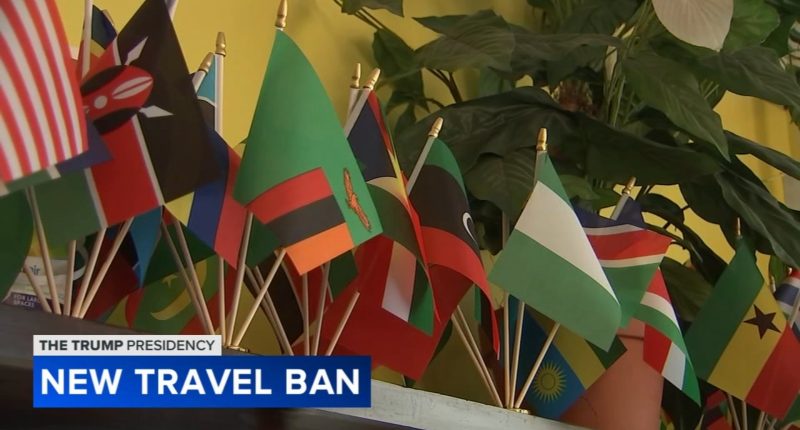Share this @internewscast.com
CHICAGO (WLS) — President Donald Trump is resurrecting his travel ban.
This time, most of the countries on his list have populations that are majority Black, many with relatives in the Chicago area.
ABC7 Chicago is now streaming 24/7. Click here to watch
Ednerson Jean Baptiste moved from Haiti two decades ago. Given the severe instability and danger in his homeland, he hoped that more of his relatives could join him in Chicago.
“As immigrants, we understand the value of hard work,” stated Jean Baptiste. “When we arrive in this country, our aim is not to create problems. We want to contribute and strengthen the economy because we see this as an admirable nation.”
This is a xenophobic attempt at family separation, and just the rhetoric around it just doesn’t match the countries that are listed.
Fasika Alem, United African Organization
However, President Trump believes people from certain countries are in the U.S. to cause trouble.
Haiti is one of 12 countries on a travel ban to begin Monday. Seven other countries have restrictions.
“Well, we don’t want to have other bad people coming into our country, by using the word bad, I’m being nice,” Trump said.
Besides Haiti, the travel ban mostly affects the Middle East and Africa.
“We strongly view this as a xenophobic effort to separate families, and the discourse surrounding it doesn’t align with the countries listed,” expressed Fasika Alem from the United African Organization.
President Trump escalated his immigration crack down following the recent attack in Boulder, Colorado. The suspect charged overstayed his VISA. He is from Egypt, which is not on Trump’s list.
The United African Organization helps resettle refugees. Alem, a program director, said the ban not only prevents families and friends from spending special events together. It also affects Americans who adopt a child from one of the countries.
“I was to adopt a child from any of those countries, it would not enable them to migrate under family based petition, they would be restricted because they are not blood relation,” Alem said.
Alem and Jean Baptiste said most people leaving the countries on Trump’s list are doing so because they are escaping war or persecution not caused by their own actions.
“There’s a lot of Haitians who would probably whether to die here than to go back to like, you know, certain part of the country because of the unsafe, because of there isn’t there’s no safety there,” Jean Baptiste said.
Like it did in 2016. the United African Organization said it will join with other refugee organizations to push back against the travel ban, which could possibly mean legal action.
“Nobody wants to leave home unless they have to, and I think that is important for people to understand,” Alem said.
Copyright © 2025 WLS-TV. All Rights Reserved.

















